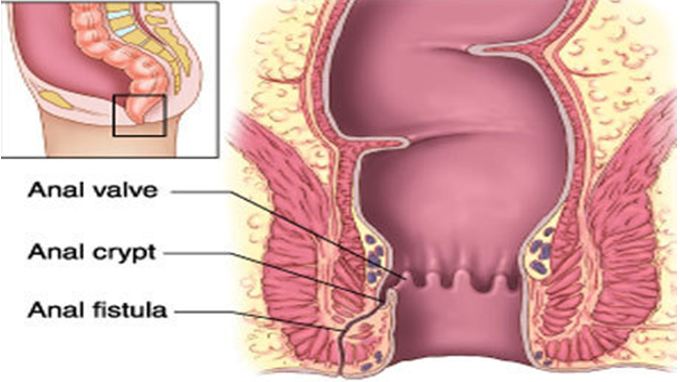A fistula is an abnormal connection between two body parts, such as an organ or blood vessel and another structure. Fistulas are usually the result of an injury or surgery. Infection or inflammation can also cause a fistula to form.
Types of fistula can be described by their location. Anal fistulas connect between the anal canal and the perianal skin. Anovaginal or rectovaginal fistulas occur when a hole develops between the anus or rectum and the vagina. Colovaginal fistulas occur between the colon and the vagina. Urinary tract fistulas are abnormal openings within the urinary tract or an abnormal connection between the urinary tract and another organ such as between the bladder and the uterus in a vesicouterine fistula, between the bladder and the vagina in a vesicovaginal fistula, and between the urethra and the vagina in urethrovaginal fistula.
When occurring between two parts of the intestine, it is known as an enteroenteral fistula, between the small intestine and the skin as an enterocutaneous fistula, and between the small intestine and the colon as a colocutaneous fistula.
Fistulas can result from an infection or inflammation, injury or surgery. Fistulas are sometimes purposefully surgically created as part of a treatment, for example arteriovenous fistulas for haemodialysis.
Treatment for fistula varies depending on the cause and extent of the fistula.
Ayurveda believes fistula is a surgically curable condition. Para-surgical procedures like Ksharasutra and Agnikarma are also recommended for its management. Along with surgical treatment, basic diet and lifestyle changes can help relieve the symptoms.
Symptoms include
Abdominal pain
Itching
Recurrent boils or abscess surrounding anus with pain
Constipation
Constant urine leakage from the vagina
Irritation in the external female genital organs
Frequent urinary tract infections (UTIs)
Leakage of gas and/or feces into the vagina
Fluid drainage from the vagina
Nausea
Vomiting
Diarrhoea
Enquire Now
Get Admission
0484-2653041, +91 9747410263
For Treatment enquiry
+91 9747410270,
+91 9747410284







